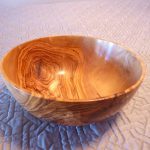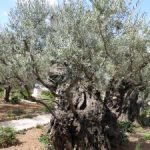It’s doubtful that people ever actually want to meditate on suffering. But these mediations do come in the course of our lives, through direct or indirect circumstances. About two years ago, I wrote to you about the death of my cousin, Brian. In early Spring, I wrote about standing and looking at gnarled and twisted olive trees and thinking about the agony of Jesus. This summer, I lost my father suddenly. It seems this is a season ordained for my family to meditate on suffering.
It’s been two months now. Divine words, understanding eyes, funny notes and care packages of cookie dough are small candles along a dark forest floor on a cold night, leading me home. As I’ve been working my way along this dark path, looking for the candles put there to guide and comfort me, I’ve returned to those olive trees in Gethsemane.
 I was preparing dinner a few weeks ago and I needed a bowl for the salad. One of my uncles is a master woodworker. Several years ago, my father, proud supporter of his brother’s craftsmanship, bought some custom serving bowls that had formerly been large, scraggly olive wood burls, and gave them to my siblings and I. This was the bowl I selected. I took it down and held it, wantonly neglecting dinner preparations, struck by its warm color and the beautiful natural designs and shape revealed in the wood.
I was preparing dinner a few weeks ago and I needed a bowl for the salad. One of my uncles is a master woodworker. Several years ago, my father, proud supporter of his brother’s craftsmanship, bought some custom serving bowls that had formerly been large, scraggly olive wood burls, and gave them to my siblings and I. This was the bowl I selected. I took it down and held it, wantonly neglecting dinner preparations, struck by its warm color and the beautiful natural designs and shape revealed in the wood.
Burls are areas of deformed growth on trees, often filled with small knots of dormant buds. A burl results from a tree undergoing some form of stress. It may be caused by an injury, virus or fungus. How like the burls in the wood on that olive tree is the pain and suffering of this world that seeps into our lives. How loving and skillful were my uncle’s hands as he took something diseased and deformed, not meant to be there at all, and turned it into this beautiful vessel, freed to reveal its true beauty and character, hidden inside an ugly disguise. How telling that the burls are filled with dormant buds — something that has potential, that is meant to grow and blossom when it is in the hands of someone who knows it and loves it, who isn’t afraid to cut into it because he knows its potential. How meaningful that 2000 years ago, Jesus was a carpenter, doing the same thing with wood for the vast majority of his life, and then for a little while but with earth-shattering effect, with souls.
 Today, those olive trees in Gethsemane are pictures of suffering themselves – over 900 years old, bent, twisted, and misshapen. They have seen much, silently internalizing it all, continuing to survive. They stand as monument to a man who bore the entire weight of human suffering for all mankind, for all time, and freed us from it.
Today, those olive trees in Gethsemane are pictures of suffering themselves – over 900 years old, bent, twisted, and misshapen. They have seen much, silently internalizing it all, continuing to survive. They stand as monument to a man who bore the entire weight of human suffering for all mankind, for all time, and freed us from it.
In the first week weeks after my father’s death, I had a strong sense of having stepped behind a veil, into a world that at the surface looked very similar to my old one, but in which my understanding of reality had fundamentally shifted. I remember hiding in the back of the sanctuary at my church the first time I attended after my dad’s death, looking out over the crowd, and being overwhelmed by an awareness of the collective knowledge of suffering in the room. I looked at the backs of heads, and thought about what these other lives and hearts were going through, what losses they had suffered, what darkness they… we… all of us… walk through at some time or another in our lives.
I imagined being in a room, an antechamber, off to one side of the sanctuary that morning. I knew without a doubt that so many people who I congregate with on a regular basis were standing in that antechamber with me, and they were suffering too. They had also stepped behind the veil. I imagined looking into eyes that have seen terrible things, feet that have walked long, hard roads, souls (and bodies) that are scarred. As I was drawn back into the large auditorium I was actually standing in, I felt God granted me in that small vision a new appreciation for the grace of community. I didn’t talk to anyone that day, I snuck out quickly so I wouldn’t have to engage with people, but I didn’t feel alone.
So this has become my prayer: God, would you take the diseased and deformed growths in our lives, the results of evil and death, the causes of much suffering in our lives, and turn them into things with your loving hands that can hold more, that can reveal true beauty, and thus, spite the ugliness? Would you continue to reverse and triumph over the effects of sin in this world? Would you make me into an olive wood bowl, whose true character is revealed, who can hold more than she ever could before, and be a vessel of your love in this world? It’s okay if all this has to be done through suffering, it’s okay if my pain is consecrated in your service. Like John Mark McMillan says, “You love me like death in reverse.” Make this tragedy an invitation to go deeper into life. Amen.
